Kim H. Esbensena and Elke Thistedb
aChairperson WCSB10 Scientific Committee
bChairperson WCSB10 Organisational Committee
DOI: https://doi.org/10.1255/sew.2022.a17
© 2022 The Authors
Published under a Creative Commons BY-NC-ND licence
The world community of sampling has reasons to celebrate. The 10th World Conference on Sampling and Blending (WCSB10) took place between 31 May and 2 June 2022 in Kristiansand, Norway. It was the first physical gathering of members of the international sampling community in 2.5 years. A total of 121 in-person attendees from 20 nations together with 19 online attendees who, for one reason or other, could not travel to Norway. In the summer of 2021 when prospects for in-person gatherings of this magnitude were distinctly bleak, the organisational committee nevertheless made a deliberate decision to prepare for success and to go all out for an in-person conference. As it turned out, this paid off beautifully; a total attendance of 140 is right on par with several earlier conferences. From many personal reactions and statements, it was clear that the international sampling community had been starved of physical interaction. Again and again, delegates declared their excited satisfaction over simply being together again and being able to freely interact vis-à-vis one-another—to the delight of the scientific and organising committees.
A Jubilee conference
WCSB10 was a jubilee conference. It is now 70 years since the first concepts and ideas of what was to become the Theory of Sampling (TOS) were first formulated by Pierre Gy, which has since found application in a growing number of industrial application areas, at first in the “original sectors” of mining, minerals processing and metals (M3), cement a.o. This has in fact been the stable historical status quo until the turn of the millennium when the series of WCSB was initiated. Though the TOS has a clear role to play as an important part of modern society’s drive for sustainable processes and products, there is still a long way to go before this will be fully implemented. In fact, for all the first 20 years of organised activity during 10 World Conferences, there has been a deliberate scientific and technological outreach to other industry sectors and to society in general as a priority.
This is where WCSB10 was a highly satisfactory success. More than 50 % of the contributions addressed application areas beyond M3 in technology, industry, society, commerce and trade, e.g. food, feed, agriculture, pharmaceutical production, with special focus on QA/QC/QM, Process Analytical Technologies (PAT), environment, sustainability, circular economy, and also witnessed by the concluding session “Around the world/new developments/going forward”. Likewise, there was substantial coverage of how representative sampling is a necessary element in companies’, corporations’ and organisations’ quality management objectives and environmental goals—and how to optimise the use of natural resources and raw materials (finite and renewable) with considerations of the environmental impact.
WCSB10 specifically targeted the UN world development goals nos 9 and 12, which address sustainable industry, innovation and infrastructure (9) and responsible production and consumption (12). The conference contributed towards fulfilling the aspirations embedded in these international goals. Thus, WCSB10 lived up to its broader scope, honouring the pronounced sustainable dimension set up by the conference host, the industrial EYDE-Cluster. WCSB10 strengthened a conscious attitude towards sampling quality in the broader sense—and helped foster a proper mindset in many new application fields, technology and industrial sectors.
The conference homepage will be continued as a depository for results, achievements and common as well as individual experiences, not least a plethora of photographs: https://wcsb10.com/
Please follow the link on the WCSB10 homepage to see the conference report “Participants from 20 countries at the WCSB conference”.
D3
A special thank you and a strong recommendation goes to the company D3, which was retained to take care of all IT aspects—a task carried out to perfection. The execution of all technical tasks for running the three-day conference went without a glitch. The magnitude of the necessary online facilities could not be predicted before the conference, as many potential participants were unable to make a firm decision GO/NO GO until immediately before the start of the conference due to the different COVID situations across the globe. Thus, WCSB10 had to be ready to accommodate an essentially unknown proportion of online participants and contributors. In close collaboration with the organisational committee, D3 organised a seamless integration of what turned out to be only a small number of pre-recorded or live contributions, while producing full coverage with a perfect streaming facility for all three conference days. All hail to D3 for a thoroughly professional job! https://www.d-3.no/
“Thank you and congratulations to the organising committee of the WCSB10. From feedback I received from colleagues who attended in person, the conference went off very well, despite all the challenges faced.
Due to personal reasons, I was, unfortunately, unable to attend in person, so I can only speak to my experience of the virtual conference, which was brilliantly executed. It is always difficult to get engagement and a good flow during virtual conferences like this, but the WCSB10 team managed to successfully pull it off. With good connection for 99 % of the time, well integrated pre-recordings of papers and online contributions, to accommodate those who could not attend. The technically excellent displays of speakers and their presentations really made this a great experience.
This was one of the best online conferences I have ever attended.”
Trevor Bruce
Radisson Blu Caledonian Hotel, Kristiansand
A similar huge appreciation goes to the venue hotel, Radisson Blu Caledonien, for a thoroughly professional collaboration throughout the COVID-uncertain year leading up to the conference start. At ground zero, 29 May–3 June, this was put to the test in full earnest and passed with flying colours—whatever logistical and practical issues were thrown at the hotel staff and administration were solved promptly and efficiently.
Proceedings
As the immediate exuberance of in-person, or online conferences eventually begins to fade, on the longer historical scale the lasting documentation of any scientific conference is its proceedings.
The 2022 WCSB10 Proceedings were edited by Kim H. Esbensen and Anne Jodon Cole.
WCSB10 decided to make use of the then-novel proceedings format and production schedule developed for WCSB7, using the same editor and publisher, allowing contributors the advantages of the shortest possible submission and review deadlines on record. This was a deliberate goal for WCSB10, setting out a modern standard for digital proceedings a.o. cutting down significantly on the duration of the editorial tasks of servicing authors with very different experiences of resubmission, reviewing and revising manuscripts. The final quality of the proceedings provides the scientific touchstone for posterity. Great appreciation goes to the publisher IMP Open, Chichester, UK (https://www.impopen.com/)
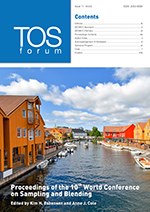
The most important aspect of a modern proceedings is for it to available OPEN ACCESS for everyone interested, particularly also beyond the immediate target audience. The WCSB10 proceedings can be downloaded free of charge from https://www.impopen.com/wcsb10
WCSB7/10 has developed a complete script for comprehensive, ultra-fast, top-quality proceedings production—available for other conferences should organisers desire.
WCSB10 host organisation and organisational committee
The idea of hosting the World Conference on Sampling and Blending in Kristiansand, Norway, arose at the 2017 8th WCSB conference in Perth, Australia. Arranging such an event to spread knowledge on how to sample correctly, discuss current issues in modern industry and get a lifeline on how to proceed in a more sustainable direction with less variation in processes, fitted very well with the vision of the industrial EYDE-Cluster, the Norwegian Centre of Expertise (NCE) for Sustainable Process Industry, working for transition towards a sustainable future. Therefore, a proposal for WCSB10 was presented to, and approved by the EYDE-Cluster in 2018. From that day, a compact preparatory committee consisting of Elke Thisted (Glencore ‘Nikkelverk’), Marianne Furuholt (EYDE-Cluster) and Kim Esbensen (KHE Consulting) started planning towards WCSB10. The schedule pointed to 2021, but the global COVID situation disrupted the regular biannual WCSB series. However, when the time was again right, a regrouped committee of seven members of, and employees in the EYDE-Cluster as well as partners and professional friends, went to work again—and the conference was finally ready to be launched in Kristiansand in 2022. A deep gratitude for dedicated hard work and a very agile attitude goes to:
Kristine Fuller-Gee (EYDE-Cluster), Anne Ormshammer (EYDE-Cluster), Ellen Nordgård-Hansen (NORCE), Gro Wickstrøm (GROW), Anne Cole (ReConsider), Kim Esbensen (KHE Consulting) and Elke Thisted (Glencore ‘Nikkelverk’).
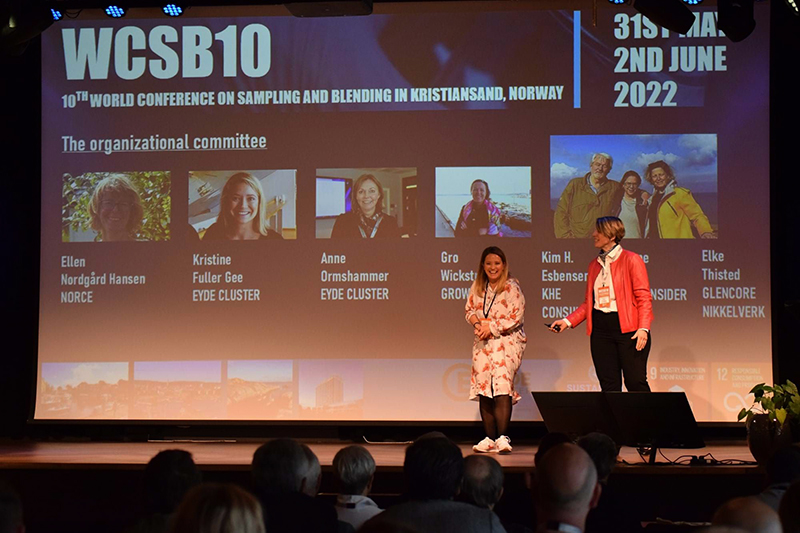
Well-deserved recognition to the Organisation Committee (background) with Conference Secretary extraordinaire Kristine Fuller-Gee and Chairperson Elke Thisted (live). Photo credit: WCSB10
WCSB10 Scientific committee: review corps
Conference proceedings are no better than the peer-reviews involved. Efforts are always directed at securing a corps of reviewers with the optimal scientific competence and experience.
The 2022 WCSB10 corps consisted of Roger Brewer, Stephane Brochot, Trevor Bruce, Quentin Dehaine, Oscar Dominguez, Simon Dominy, Karin Engström, Kim H. Esbensen, Dominique Francois-Bongarcon, Ralph Holmes, Dr Li Huachang, Martin Lischka, Pentti Minkkinen, Richard Minnitt, Claudia Paoletti, Bert Pauels, Francis F. Pitard and Aldwin Vogel.
A very great THANK YOU to all for this essential contribution!
Meeting point: exhibition and poster session
During coffee breaks and a wine tasting event, sponsored by Elgin wines, South Africa, conference participants could learn more about sampling equipment, automation and direct analyses of process flows a.o. from conference exhibitors. There were many fruitful discussions at the different stands provided by FLSmidth, Metrohm Process Analytics, Iteca Socadei, Multotec, Scott Automation/Rocklabs and Scantech. It was also possible to chat and discuss at three poster sessions with authors presenting their work spanning a wide coverage of correct sampling and the TOS as well as a call to action regarding the future evolution of the world’s only horizontal sampling standard, DS3077.
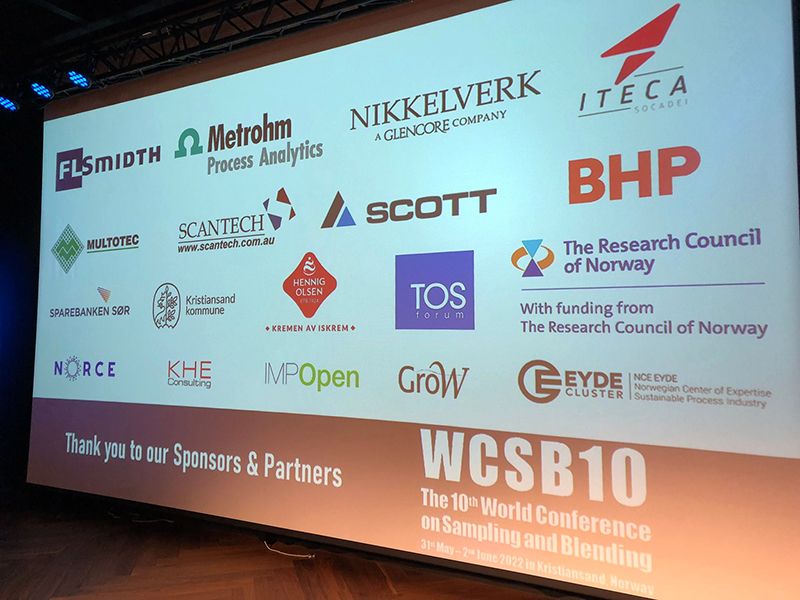
Testimonials
The weeks immediately after WCSB10 witnessed a flurry of personal impressions and testimonials from happy participants at WCSB10’s LinkedIn homepage, which can all be found at https://www.linkedin.com/company/wcsb10/
Suffice to quote a fairly “representative” impression from the many personal impressions:
“WCSC10 was a great opportunity to interact with the growing community of scientists and technologists who are applying TOS. The conference provided ample opportunity to see the Governing Principles and Sampling Unit Operations applied to industrial processes. The presentations also showed a growing interest in real-time process monitoring through the field of Process Analytical Technology (PAT).
Kristiansand provided a very relaxing atmosphere for the conference. The meeting hall and exhibition spaces were well organised, with good opportunities for relaxing walks together with colleagues, or chats on the balcony of the conference area.
I believe all participants will carry home great memories of this conference, and a renewed and strengthened enthusiasm to keep learning and contributing. WCSB10 leaves an important legacy through our memories, and through the OPEN ACCESS proceedings, which document the current state of our field and of the opportunities to move forward.”
Rodolfo Romanach
Reinvigorated IPGSA Council
The last in-person Council meeting of the International Pierre Gy Sampling Association (IPGSA) took place in August 2019 at WCSB9 in Beijing, after which COVID disruptions ruled for a long time resulting in a pronounced inactivity.
At the concluding General Assembly session at WCSB10 it was finally possible to take a fresh stock of the duties and obligations. The first point of business on the IPGSA General Assembly agenda was election of a new Council, a task easily accomplished as many members were ready and willing to contribute in the form of several new members and a contingent of Council members willing to carry on. It was decided to augment the number of Council members with two, now totalling 10 (plus four fixed positions: President, Vice-President, Treasurer and Webmaster/Publications) The new IPGSA Council, looking at a time horizon of two to four years ahead was voted in with acclamation.
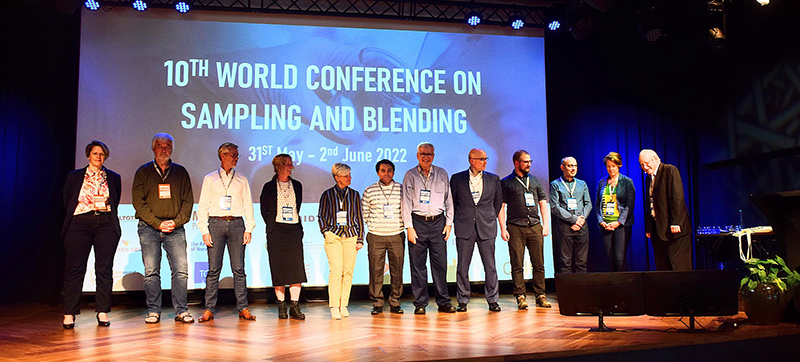
Newly elected IPGSA Council (left-to-right): Elke Thisted, Kim H. Esbensen, Philippe Davin, Karin Engström, Claudia Paoletti, Oscar Dominguez, Rodolfo Romanach, Aldwin Vogel, Martin Lischka, Stephane Brochot, Sheryl Tittlemier, Ralph Holmes. Photo credit: WCSB10
It is fair to say that WCSB10 marks a generational shift for the IPGSA Council.
At its first meeting in the 2022–2024/2026 period there was an urgent interest and willingness to get to work. The first item will be to bring the IPGSA Foundation in alignment with the new post-COVID realities. After this has been taken care of, the world sampling community will no doubt soon hear what other measures will be taken by the new Council. After a period of 20 years in which focus naturally has been to initiate, grow and secure a firm organisational support, time has come to look ahead with fresh views as all necessary basics are now well in place: the IPGSA association, a bank affiliation (having escaped organisational account slaughter by banks involved in the Panama Paper scandals now cleaning up their reputation), highly successful biannual WCSB conferences, the IPGSA homepage and the publications outlets TOS Forum and this Sampling Column in Spectroscopy Europe/World.
The new IPGSA Council 2022–2026 has the floor going forward…
Pierre Gy Sampling Gold Medal (PGSGM)
A scientific highpoint at all WCSB conferences is the tradition of revealing the recipient of the PGSGM awarded for “Excellence in dissemination and teaching of the Theory of Sampling”.
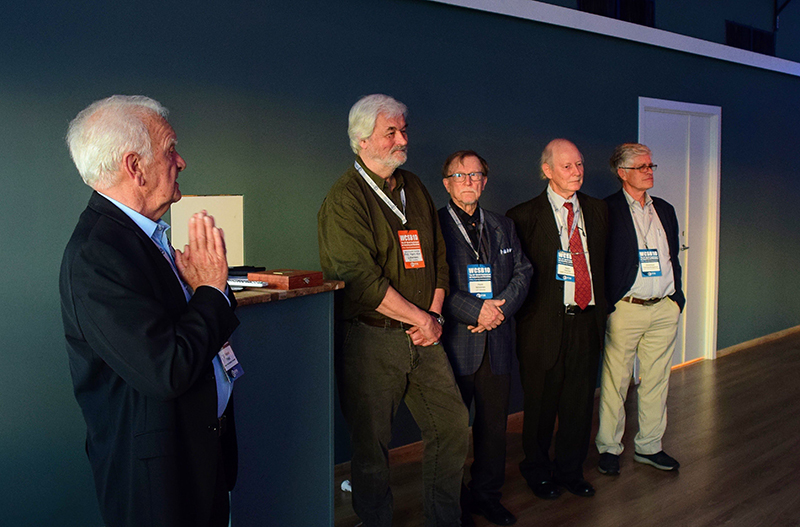
The PGSGM committee (Francis Pitard, Kim H. Esbensen, Pentti Minkkinen, Ralph Holmes, Dominique Francois-Bongarcon), with medal and ready to go—but without the awardee. Photo credit: Rodolfo Romanach.
The PGSGM committee had duly submitted the name of the WCSB10 selectee, the medal had been minted and was present in time for the gala dinner on the penultimate day of the conference, at which the august committee gathered on the stage for the traditional award ceremony. But the 2022 event had a different slant than any before—the recipient was not present, neither physically nor online (due to legitimate reasons for absence: he was working at an isolated remote location in the Australian outback).
The Gold medal’s worthy recipient this year is Dr Simon Dominy.
To honour Simon, the committee took centre stage at the gala dinner with an introduction by Kim H. Esbensen, providing the audience the background of the origin and history of the PGSGM, and a salute to Simon by Francis Pitard, giving the reasons for the committees’ selection, i.e. a consistent, impressive dissemination effort over many years.1
The medal was subsequently delivered by hand to Simon Dominy in Perth, courtesy of two WCSB delegates returning to Australia after the conference. All’s well that ends well ...
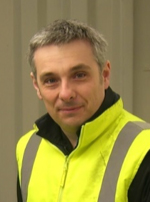
Simon Dominy
Dr Simon Dominy is a mining geologist-engineer with over 25 years based in operations, consulting and academia. He has experience across mine production, corporate business development and multi-disciplinary studies. Simon has a background in underground operations management and technical/leadership roles, with multi-commodity and continent experience. He has worked across the mine value chain from project studies, through to mine reopening/development, operations and operational improvement. He is a Visiting Associate Professor at the Camborne School of Mines, University of Exeter, UK, and holds technical roles with Novo Resources Corporation, Artemis Resources Ltd and OCX Gold Group. Simon points out that it was his encounter with “Le Bon” Royle c. 1990 that initiated him to the field of sampling. Le Bon Royle was the very first PGSGM recipient (2003).
WCSB11
The last item on the agenda for the newly elected Council was to decide on the venue of the next conference, WCSB11. There was only one bid, submitted as a perfunctory application commensurate with all the necessary stipulations listed in the IPGSA Foundation. Consequently, the Council unanimously decided that the next venue shall be in Centurion County, Gauteng, South Africa. WCSB11 shall be co-chaired by Dick Minnitt (prof. emeritus, WITS) and Terance Nkosi, executive head SHEQ and Technical Assurance, Rand Refinery, Johannesburg (Germiston). IPGSA looks forward to returning to South Africa.
Things to come…
By coincidence, or maybe no coincidence at all? Perhaps the most notable impression of WCSB10 was captured by the snapshot below of the full complement of the organisation and scientific committees at a refreshment pause on the 13th floor of the venue hotel. Guess which gender is taking over running the show these days—also in highly technical, specialised scientific disciplines? No worries for the future….
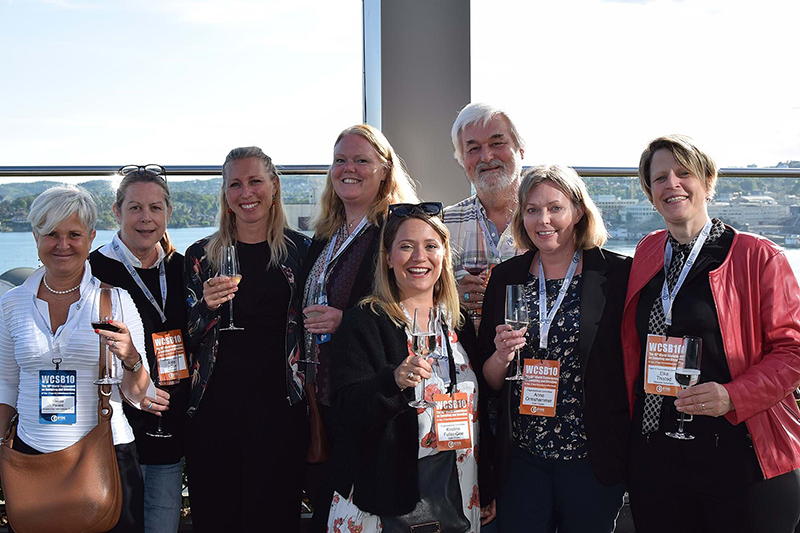
The entire WCSB10 organisational and scientific committees, including erstwhile initial member Marianne Furuholmen (left of the only male in this happy group). For good measure keynote speaker Claudia Paoletti joined in the photo fray. Photo credit: WCSB10
Epilogue: an 1000-year historical closure
Pierre Gy, when engaged about the matter, fondly told about his firm opinion that his family originated from the Normandie region in France, not from the Mediterranean coast (Nice and Cannes) where he lived most of his career. He further clarified that his family name, distinctly non-French, is related to Norwegian Vikings who raided La Normandie pretty much exactly 1000 years ago… In fact, Pierre Gy stated with conviction that his family was a direct descendant of one of the Norman Vikings! It is a no-brainer to deduct from where and why this region of France got its name.
Fast forward to 1999, when Pierre Gy was an invited speaker at the Sixth Scandinavian Symposium on Chemometrics (SSC6), Porsgrunn, Norway: https://bit.ly/GySSC6
At the symposium Pierre requested a personal favour from the chairman (KHE), asking for directions to a place “near Flekkefjord” he had researched as part of his private preparations for SSC6, to which he wanted to drive himself and his wife after the conference. The chairman went out of his way to accommodate this wish, but could unfortunately not accompany Pierre and Sylvia himself at such short notice. Alas this is one of the things the chairman has since regretted bitterly, because it turned out that the drive was a bit too long and strenuous for the enterprising couple within the time available—much to their regret.
Pierre Gy’s intended destination was a small mountain valley “Gyland”, in the Flekkefjord municipality. Gyland is situated in a nearby inland area with a large lake “Kongevoldvannet” surrounded by forests, containing several islands of various sizes. He was of the firm opinion that he would be able to “close the family history circle” if he could find the location of a former Viking settlement in Gyland—emphasis on IF he could find it…
As preparations for WCSB10 were underway, chairpersons KHE and ET debated if and how perhaps to make a half-day off-conference visit to Gyland—as a surprise for conference participants. Alas again, it turned out that this drive was deemed a bit too long and cumbersome, this time because of the already completely full, intense conference programme and schedule, much to our regret.
However, the “last man standing” in the aftermath of WCSB10 happened to be KHE, relaxing with a few colleagues and friends after the conference in the hamlet of Tregde (some 40 km west of Kristiansand). After all guests were happily sent off home in many directions, co-editor Anne J. Cole and KHE decided to set time off for a half-day excursion to do a little research in the hamlet of Gyland, which was only slightly more than one hour’s drive away… And luck was present that day: with the help of the proprietor of the local convenience store in town, and a brief telephone conversation with a local history expert, the quest of the roots of Pierre Gy and his family has possibly finally come to light.
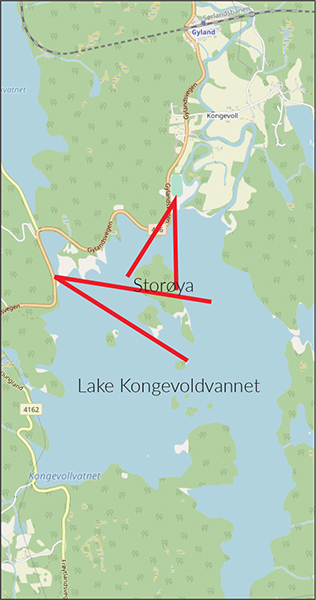
Lake Kongevoldvannet with the island of Storøya where alleged Viking age archaeological artefacts have been found. View angles of additional photos indicated. © OpenStreetMap contributors, https://www.openstreetmap.org/copyright
Below follows a brief photo documentation from the contemporary hamlet Gyland, with the island “Storøya” in the centre of the dominant lake “Kongevoldvannet”, where archaeological finds have been dated to the “Viking age”.
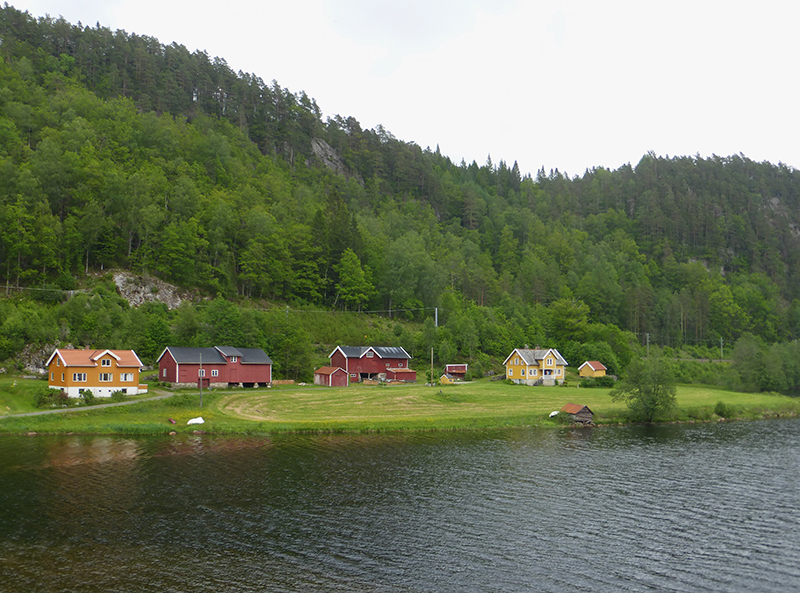
Farm cluster in Gyland anno 2022. Photo credit: Anne J. Cole
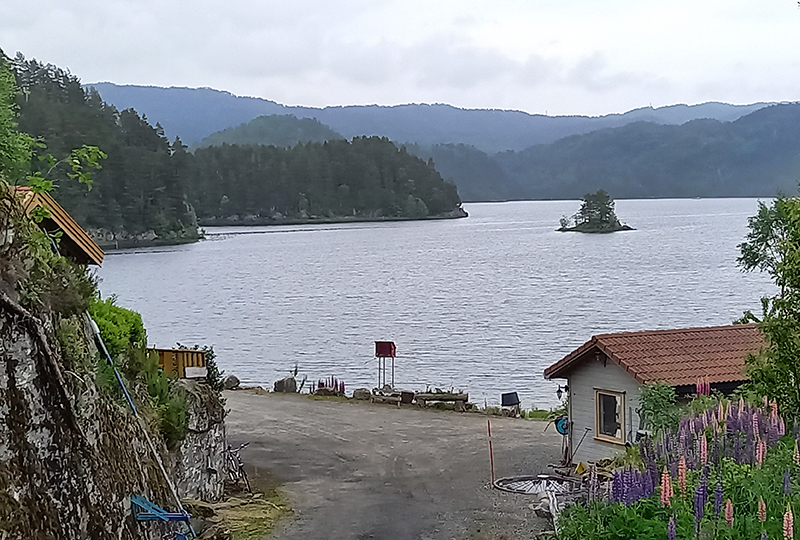
Looking across 1000 years of human presence at the island “Storøya”, shown in close-up below. Photo credit: Anne J. Cole
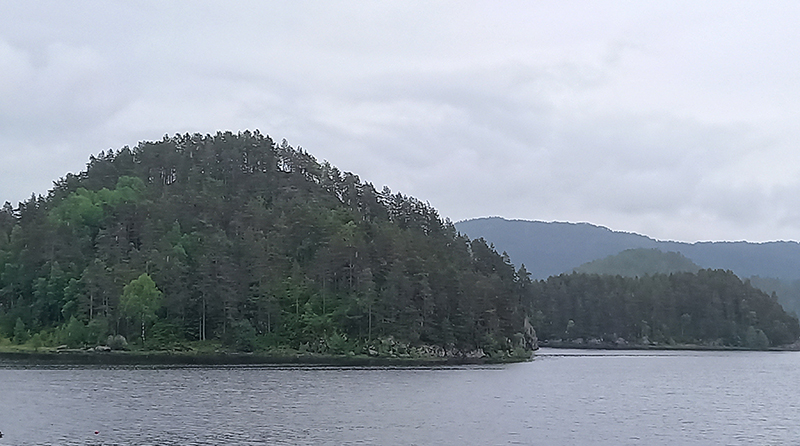
Close-up of “Storøya”, where Viking age artefacts are alleged to have been found. Could this be where “all of science-backed sampling” originated? Photo credit: Anne J. Cole
Looking at the shoreline of Storøya, one would dearly like to believe that this is perhaps closing the gap of the ~1000-year story of the Gy family. This likely could be the place of origin of the Viking family that took the name “Gyland” (meaning “from Gyland”). Perhaps the raiding parties setting out from the coastal area which is now the Flekkefjord region included members from the local neighbourhood—young Vikings eager to prove themselves in raids to foreign lands? Or perhaps equally likely, and much less violent, according to the Encyclopaedia Britannica (online version), the Normandy coast was repeatedly raided by Vikings (“Nordmenn”, “Northmen”) from the 8th century onwards. The French king Charles III the Simple, ceded the territory around Rouen and the mouth of the Seine to Rollo, the chief of the largest Viking group, in the Treaty of St Clair-sur-Epte (911). What followed was a large immigration of Rollo’s countrymen who settled the country and adopted the local culture and language. There is, of course, much more work to do to further document the Gy family history in France in more detail, which is what Pierre Gy had hoped to do. What is known is that as time passed, the name Gyland was abbreviated to Gy—and the rest, as they say, is history!
Is this the historical background for where, in a sense, “science-backed sampling” originated?
It was a distinct pleasure to try to complete this important family link of the founder of the TOS, alas without his own fulfilment. But this is nevertheless an interesting historical background for the international sampling community.
Reference
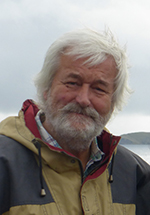
Kim Esbensen
Kim H. Esbensen is an international expert and consultant in sampling (Theory of Sampling, TOS), chemometrics and PAT (Process Analytical Technology). Through a 35-year academic career involving three professorships, he has conducted R&D across a wide range of application fields, primarily in process industries (mining, minerals extraction and processing, bio-fuels, recycling, environmental monitoring, nuclear waste) in environmental science a.o. In 2015 he established an international consultancy (KHE Consulting). Esbensen has been responsible for a university educational programme straddling 30+ years in chemometrics, PAT, TOS, instrumental analysis, Multivariate Image Analysis (MIA), process technology and Philosophy of Science, currently in the form of a continuing education curriculum offered via KHE Consulting. His CV lists ~300 publications and ~400 lectures/presentations. He is a recipient of the Pierre Gy Sampling Gold Medal (2013), and the Russian Chemometrics Society Gold Medal (2012). In 2003 he inaugurated the biannual series of World Conferences on Sampling and Blending (WCSB), now in its 10th edition—https://wcsb10.com. Esbensen is editor of the scientific magazine TOS Forum and of the Sampling Column in Spectroscopy Europe/World. Esbensen’s credentials are documented in full at KHEC’s website: https://kheconsult.com. Esbensen was head of the Scientific Committee for WCSB10, June 2022 in Kristiansand, Norway. 0000-0001-6622-5024
0000-0001-6622-5024
[email protected]
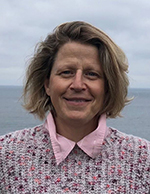
Elke Thisted
Elke Thisted has worked as the Manager of Online Analysis & Development at Glencore Nikkelverk in Kristiansand, Norway, since September 2018. She studied Chemistry at the Technical University in Karlsruhe, Germany, from where she was awarded a MSc (chemistry) in 1998. She received a PhD degree from the Norwegian University of Technology and Science in Trondheim in 2003 in the field of impurities in aluminium electrolysis. From 2004 to 2014 she worked in Elkem, Norway, on method development (measurement, processes and products). Since 2014, she has worked at Glencore Nikkelverk as Lead Process Engineer responsible for process mapping and improvement based on Nikkelverk’s business system (LEAN). She has since then worked with variography to broaden applications in the process industry, applying experiences and knowledge gained “in-action” to Glencore Nikkelverk’s Online analysis framework. Thisted joined the IPGSA council in 2017. She was Chairperson and head of the organisational committee for WCSB10, June 2022 in Kristiansand, Norway: www.wcsb10.com 0000-0001-5798-5144
0000-0001-5798-5144
[email protected]

